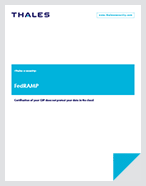FIPS 199 and FIPS 200

Regulation | Active Now
FIPS Publication 200 is a mandatory federal standard developed by NIST in response to FISMA. To comply with the federal standard, organizations first determine the security category of their information system in accordance with FIPS Publication 199. Thales can help you meet the FIPS 200 and FIPS 199 data security compliance standards.
- Regulation
- Compliance
FIPS 199 and FIPS 200
According to NIST Special Publication 800-53, Revision 4:
FIPS Publication 200, Minimum Security Requirements for Federal Information and Information Systems, is a mandatory federal standard developed by NIST in response to FISMA. To comply with the federal standard, organizations first determine the security category of their information system in accordance with FIPS Publication 199, Standards for Security Categorization of Federal Information and Information Systems, derive the information system impact level from the security category in accordance with FIPS 200, and then apply the appropriately tailored set of baseline security controls in NIST Special Publication 800-53, Security and Privacy Controls for Federal Information Systems and Organizations.
Organizations have flexibility in applying the baseline security controls in accordance with the guidance provided in Special Publication 800-53. This allows organizations to tailor the relevant security control baseline so that it more closely aligns with their mission and business requirements and environments of operation.
FIPS 200 and NIST Special Publication 800-53, in combination, ensure that appropriate security requirements and security controls are applied to all federal information and information systems. An organizational assessment of risk validates the initial security control selection and determines if additional controls are needed to protect organizational operations (including mission, functions, image, or reputation), organizational assets, individuals, other organizations, or the Nation. The resulting set of security controls establishes a level of security due diligence for the organization.
See FIPS 199 and FIPS 200 for more detail.
Facets of FIPS 199 and FIPS 200 compliance standards that Thales Can Help With
Core Thales capabilities that help meet FIPS 199 and FIPS 200 compliance standards include:
- Encryption and Key Management: Strong, centrally managed, file, volume and application encryption combined with simple, centralized key management that is transparent to processes, applications and users.
- Access Policies and Privileged User Controls: Restrict access to encrypted data – permitting data to be decrypted only for authorized users and applications, while allowing privileged users to perform IT operations without the ability to see protected information.
- Security Intelligence: Logs that capture access attempts to protected data, providing high value security intelligence information that can be used with a Security Information and Event Management (SIEM) solution and for compliance reporting.
In addition to helping you comply with FIPS 199; FIPS 200; FISMA; NIST 800-53, Revision 4; FIPS 140-2; and FedRAMP, Vormetric security solutions from Thales are designed to help you comply with:
- Common Criteria
- HIPAA-HITECH
- PCI DSS
- Other standards that will arise
The Vormetric Data Security Platform
The Vormetric Data Security Platform from Thales is the only solution with a single extensible framework for protecting data-at-rest under the diverse requirements of Federal Agencies across the broadest range of OS platforms, databases, cloud environments and big data implementations. The result is low total cost of ownership, as well as simple, efficient deployment and operation.
Vormetric Transparent Encryption
Vormetric Transparent Encryption from Thales provides file and volume level data-at-rest encryption, secure key management and access controls required by regulation and compliance regimes.
Vormetric Key Management
Vormetric Key Management from Thales enables centralized management of encryption keys for other environments and devices including KMIP compatible hardware, Oracle and SQL Server TDE master keys and digital certificates.
Vormetric Data Security Intelligence
Vormetric Security Intelligence from Thales provides another level of protection from malicious insiders, privileged users, APTs and other attacks that compromise data by delivering the access pattern information that can identify an incident in progress.
Vormetric Application Encryption
Vormetric Application Encryption enables agencies to easily build encryption capabilities into internal applications at the field and column level.
Vormetric Tokenization with Dynamic Masking
Vormetric Tokenization with Dynamic Masking from Thales lets administrators establish policies to return an entire field tokenized or dynamically mask parts of a field. With the solution’s format-preserving tokenization capabilities, you can restrict access to sensitive assets, yet, at the same time, format the protected data in a way that enables many users to do their jobs.
Other key data protection and security regulations
GDPR

Regulation
Active Now
Perhaps the most comprehensive data privacy standard to date, GDPR affects any organisation that processes the personal data of EU citizens - regardless of where the organisation is headquartered.
PCI DSS

Mandate
Active Now
Any organisation that plays a role in processing credit and debit card payments must comply with the strict PCI DSS compliance requirements for the processing, storage and transmission of account data.
Data Breach Notification Laws

Regulation
Active Now
Data breach notification requirements following loss of personal information have been enacted by nations around the globe. They vary by jurisdiction but almost universally include a “safe harbour” clause.




